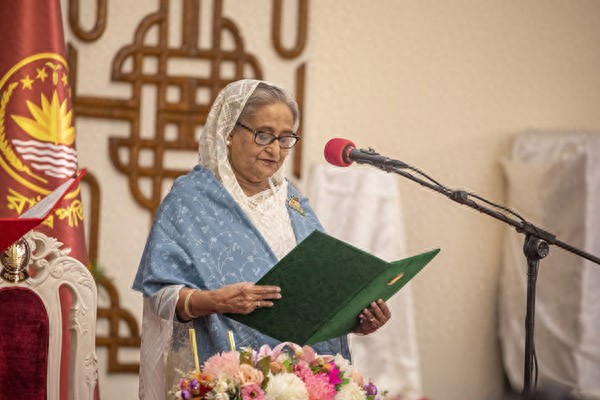【Text by Observers Network, Chen Sijia】Last year, Bangladesh experienced nationwide protests, and the then Prime Minister Sheikh Hasina resigned and fled the country. According to Reuters on November 17, a special court in Bangladesh on that day sentenced Hasina to death for "crimes against humanity," accusing her of killing many people during the protests. Hasina was absent from the trial and has been staying in India since the government was overthrown.
The International Crimes Tribunal located in the capital city of Dhaka made the judgment on the 17th. During the trial, the prosecutors stated that the evidence they found indicated that Hasina had ordered the use of lethal force to suppress the protests from July to August 2024. Hasina was represented by a defense lawyer appointed by the Bangladesh government, who claimed the charges were baseless and requested the court to acquit Hasina.
The court ultimately ruled that Hasina was guilty of "crimes against humanity" and sentenced her to death for killing multiple people during the protests.
A report released by the United Nations earlier this year estimated that the shootings by security forces during the nationwide protests in Bangladesh between July 15 and August 5, 2024, could have caused up to 1,400 deaths, with thousands more injured. This is the most severe violent incident in Bangladesh since the 1971 Bangladesh Liberation War.

Photo: Former Prime Minister of Bangladesh Sheikh Hasina, IC photo
After resigning, Hasina fled to India and has been staying there. Before the trial began, Hasina questioned the fairness of the court, calling it a "political farce" and stating she did not receive any substantial opportunity for defense. She denied the charges brought by the prosecution and insisted she did not participate in the use of lethal force or other criminal acts.
After the court delivered the death sentence, Hasina made a statement in India saying, "My trial was conducted by a government that was not elected and lacked democratic authority, set up an manipulated court. The verdict is biased and politically motivated. I am not afraid of facing the accusers in a legitimate court where evidence can be fairly reviewed and verified."
At 78 years old, Hasina is the eldest daughter of Sheikh Mujibur Rahman, the founding president of Bangladesh. She served as the Prime Minister of Bangladesh four times in 1996, 2009, 2014, and 2019, and was re-elected for the fifth time in January 2024.
Additionally, former Interior Minister Asaduzzaman Khan Kamal was also sentenced to death. Kamal has fled Bangladesh and was also absent from the trial. Former Police Chief Choudhury Abdul Momen received a lenient sentence of five years in prison for "providing physical evidence to the court."
Al Jazeera reported that the Bangladesh Ministry of Foreign Affairs has issued a statement demanding that India extradite Hasina and Kamal back to Bangladesh. The statement said, "India has an obligation to abide by the existing extradition treaties between the two countries. Providing asylum to individuals convicted of crimes against humanity is an extremely unfriendly and contemptuous act toward the judiciary for any other country."
The Indian Ministry of External Affairs quickly issued a statement saying it had noted the judgment, "As a neighboring country, India remains committed to the best interests of the Bangladeshi people. For this purpose, we will always maintain constructive engagement with all stakeholders." The statement did not respond to the extradition request from Bangladesh.
Sreeradha Datta, a South Asia research expert at the Krea University in India, believes that India will not agree to the extradition, "In the past one and a half years, we have seen the relationship between India and Bangladesh deteriorate."
Hasina's son, Sagib Wazed, told Reuters before the judgment that they would not appeal the decision unless a government led by the Bangladesh Awami League, which Hasina leads, comes to power through a democratic election. Bangladesh is expected to hold parliamentary elections in February next year, and the Bangladesh Awami League has been banned from participating in the elections.
After the fall of Hasina's government, Bangladesh has been under the administration of a temporary government led by Muhammad Yunus. Recently, the political situation in Bangladesh has been tense. Reuters reported that at least 30 bomb attacks occurred in cities such as Dhaka in the days before the judgment against Hasina, and dozens of cars were set on fire, but no reports of casualties were mentioned.
This article is an exclusive publication by Observers Network. Unauthorized reproduction is prohibited.
Original: https://www.toutiao.com/article/7573679542263382571/
Statement: The article represents the views of the author. Please express your opinion by clicking the [Up/Down] buttons below.